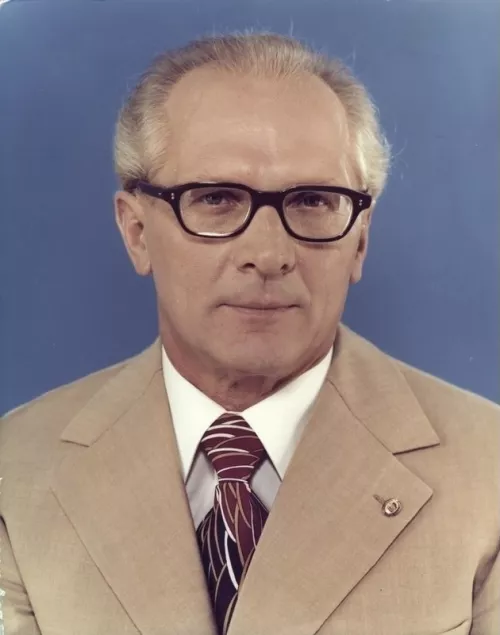Portrait of East German leader Erich Honecker, August 1976.
Photographer unknown, August 9, 1976, Bundesarchiv, Bild 183-R1220-401, CC-BY-SA 3.0, https://commons.wikimedia.org/wiki/File:Bundesarchiv_Bild_183-R1220-401,_Erich_Honecker.jpg

Leader of East Germany from 1971-1989, Erich Honecker was a hard-line communist and resisted the reforms of Mikhail Gorbachev.

Born in the Western German Saar region on August 25, 1912, Honecker was a communist his entire life. The son of a politically militant coal miner, he joined the youth organization of the Communist Party of Germany (KPD) at age 10. He was trained as a roofer, but at age 17 joined the KPD and a year later went to Moscow to study at the International Lenin School. Upon his return in 1931 he became an official in the KPD's youth branch. When Hitler came to power in 1933, Honecker joined the underground resistance but was arrested in 1935. In 1937 the Nazis sentenced him to 10 years of hard labor, and he spent the rest of the Nazi era in captivity, often in solitary confinement.
At the end of the war he went to Berlin and joined up with German Communist activists brought in from Moscow under the leadership of Walter Ulbricht. Their task was to prepare for KPD political dominance in postwar Germany and to assist the Soviet occupation authorities in running their zone of occupation. Honecker was in charge of various KPD youth organizations, and in 1946 he also became a founding member of the Socialist Unity Party of Germany (SED), composed of the KPD and the Social Democrats of the Soviet zone. He was a member of the SED leadership from the start, rising to candidate member of the Politburo in 1950 and full member in 1958. In 1961 he was in charge of the building of the Berlin Wall.
In 1971, when East-West relations relaxed somewhat and West Germany under Willy Brandt pursued its new Eastern policy, Honecker led a group of SED leaders in an attempt to depose Walter Ulbricht as party leader. With Moscow's support Honecker became the new leader of East Germany. During his near-two decades in office, he made the most of West Germany's eagerness to improve relations between the two German states by way of economic cooperation, loans, and buying the right of East German citizens to move to the West. But where West German politicians hoped ultimately to overcome the effects of the division of their country, Honecker used the situation to prop up his own regime. Thanks in part to large sums of West German money, the East German economy for a long time appeared rather robust, and the standard of living of the population reasonable.
During the 1980s, when Soviet leader Mikhail Gorbachev began his reforms, Honecker resisted the call for change in East Germany. In the fall of 1989 this led to his replacement by his Politburo colleagues. None of this managed to prevent the collapse of the East German state a few months later. From 1989 until 1993, an ailing Honecker was constantly on the run from German prosecutors to avoid accounting for his responsibility in the killings along the East-West German border during the Cold War. He was eventually released and allowed to join his daughter in Chile. A staunch believer in communism until the very end, Honecker died of liver cancer at age 81 on May 29, 1994.